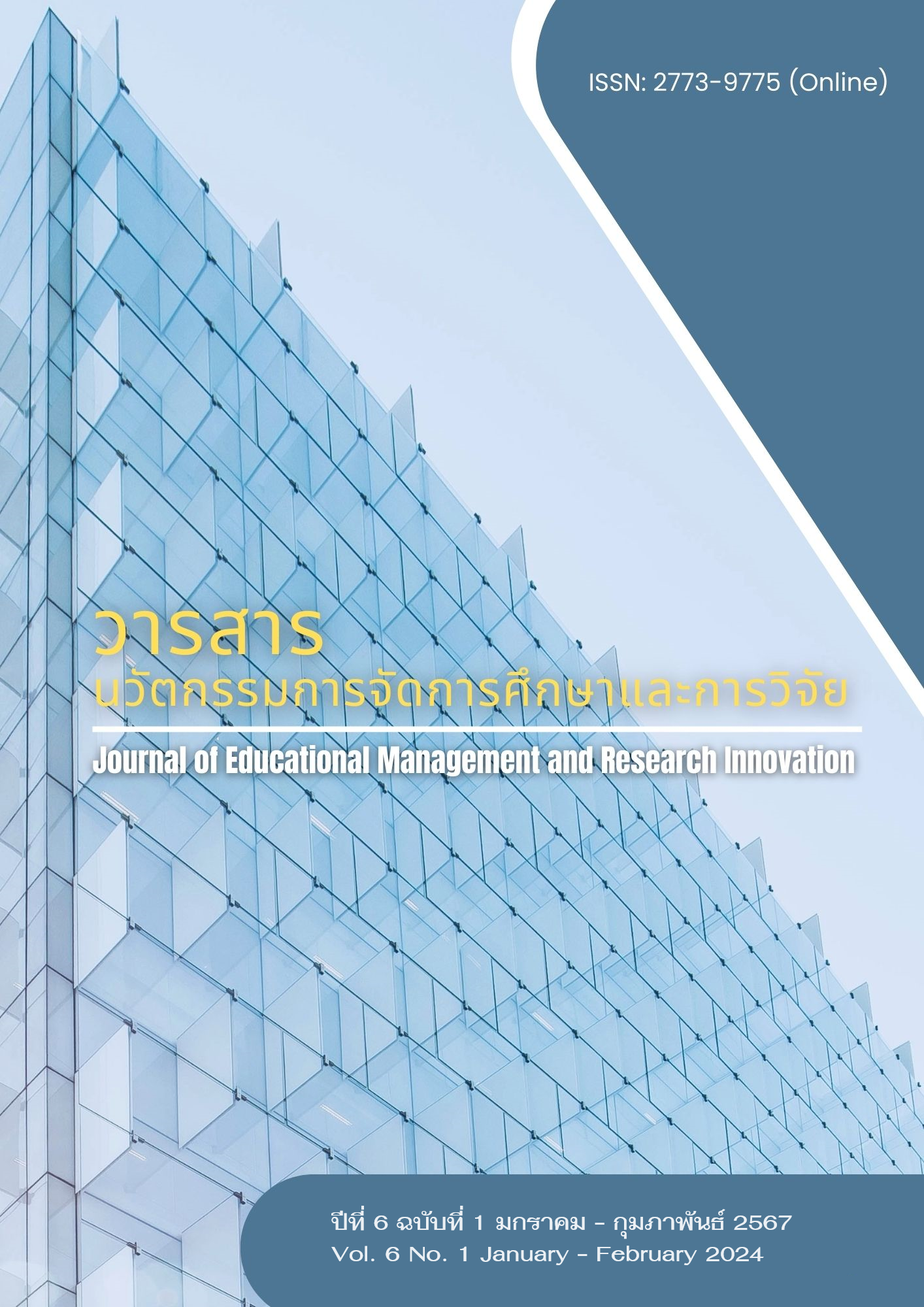การประยุกต์ใช้ขันติธรรมในการดำเนินชีวิตของประชาชนวัดค้างคาว จังหวัดนนทบุรี
Main Article Content
บทคัดย่อ
บทความนี้นี้มีวัตถุประสงค์ เพื่อศึกษาการประยุกต์ใช้ขันติธรรมในการดำเนินชีวิตของประชาชนวัดค้างคาวจังหวัดนนทบุรี การวิจัยนี้เป็นการวิจัยเชิงคุณภาพ เน้นการศึกษาเอกสาร และการสัมภาษณ์เชิงลึก และนำเสนอในรูปแบบการเขียนบรรยายเชิงพรรณนา ผลการิจัย พบว่า
1. ขันติธรรมเป็นหลักธรรมที่กล่าวถึงความอดทนต่อสิ่งยั่วยุที่เกิดขึ้นทั้งภายในจิตใจ และภายนอก สิ่งยั่วยุหรือปัจจัยภายในได้แก่ความโลภ เป็นต้น สิ่งยั่วยุหรือปัจจัยภายนอก ได้แก่ คำพูดเสียดสี เป็นต้น ขันติ ธรรมมี 4 ประเภท คือ อดทนต่อความลำบาก อดทนต่อทุกขเวทนา อดทนต่อความเจ็บใจ และอดทนต่ออำนาจกิเลส คือ โลภ โกรธ หล'
2. แนวคิดการดำเนินชีวิตของประชาชนวัดค้างคาว จังหวัดนนทบุรี พบว่า แนวทางการดำเนินชีวิตของของประชาชนวัดค้างคาว จังหวัดนนทบุรี เป็นการดำเนินชีวิตที่มีความหลากหลายในด้านครอบครัว สังคม ศาสนา และเศรษฐกิจ
3. การประยุกต์ใช้ขันติธรรมในการดำเนินชีวิตของประชาชนวัดค้างคาว จังหวัดนนทบุรีโดยการนำหลักขันติมาใช้ในการดำเนินชีวิต คือ 1) การพิจารณาเห็นโทษของความโกรธที่เกิดขึ้นจากความไม่พอใจ หรือขัดเคืองใจ ซึ่งเมื่อเกิดขึ้นแล้วก็เป็นเหตุให้สร้างปัญหา หรือประพฤติตนผิดศีลธรรม 2) เห็นคุณของขันติคือ สามารถอดกลั้นต่อกิเลสทั้งหลาย ไม่ให้ยินดีสนองความต้องการเกินจำเป็น 3) ความอดทนเป็นกุญแจสำคัญในการศึกษาเล่าเรียน การทำงาน หรือทำหน้าที่ของตนให้สำเร็จบรรลุเป้าหมาย และ 4) ความอดทนช่วยทำให้บรรลุเป้าหมายในทุกระดับคือ ในการดำเนินชีวิตระดับบุคคล ครอบครัว การพัฒนาสังคมและเศรษฐกิจ และประเทศชาติ
Article Details

อนุญาตภายใต้เงื่อนไข Creative Commons Attribution-NonCommercial-NoDerivatives 4.0 International License.
เอกสารอ้างอิง
ชาญชัย สดศรี. (2566). รองนายกองค์การบริหารส่วนตำบลบางไผ่ อำเภอเมือง จังหวัดนนทบุรี. สัมภาษณ์, 17 มกราคม.
ประยุทธ บางหลวง. (2566). ข้าราชบํานาญ กองทัพเรือ. สัมภาษณ์, 4 กุมภาพันธ์.
พระปลัดสุภัทร สุภทฺโท. (2566). เจ้าอาวาสวัดทองนาปรัง เจ้าคณะตำบลบางไผ่ อำเภอเมือง จังหวัดนนทบุรี. สัมภาษณ์, 8 กุมภาพันธ์.
พระพรหมคุณาภรณ์ (ป.อ. ปยุตฺโต). (2555). พุทธธรรม ฉบับปรับขยาย. (พิมพ์ครั้งที่ 35) กรุงเทพฯ: ผลิธัมม์.
พระอรรถชาติ เดชดำรง. (2566). การแบ่งช่วงชั้นทางสังคม : มุมมองของศาสนาพราหมณ์-ฮินดู และพระพุทธศาสนา. วารสารนวัตกรรมการจัดการศึกษาและการวิจัย, 5(2), 481-492.
มหาจุฬาลงกรณราชวิทยาลัย. (2539). พระไตรปิฎกภาษาไทย ฉบับมหาจุฬาลงกรณราชวิทยาลัย. กรุงเทพฯ: โรงพิมพ์มหาจุฬาลงกรณราชวิทยาลัย.
สุวิชัย บุญเพ็ง. (2566). นายกองค์การบริหารส่วนตำบลบางไผ่ อำเภอเมือง จังหวัดนนทบุรี. สัมภาษณ์, 18 มกราคม.
เสถียรพงษ์ วรรณปก. (2533). สูตรสำเร็จแห่งชีวิต. กรุงเทพฯ: อมรินทร์พริ้นติ้งกรุ๊ฟ.
ไสว มาลาทอง. (2542). คู่มือการศึกษาจริยธรรม. กรุงเทพฯ: โรงพิมพ์การศาสนา.
Damnoen, P. S., Siri, P., Supattho, P. S., & Kaewwilai, K. (2021). The Development of Student Characteristics in According to the Nawaluk Framework of the Buddhist integration of Buddhapanya Sri Thawarawadee Buddhist College. Asia Pacific Journal of Religions and Cultures, 5(2), 126–135.
Klomkul, L., Damnoen, S., Sawasdee, U., & Wilairadtanakun, A. (2023). Network Development of Buddhist Communication Innovative Space For Media Literacy of Thai Youths. Journal of Namibian Studies: History Politics Culture, 35, 919-935.
Phumphongkhochasorn, P., Damnoen, S., Tuwanno, D. M., Srichan, P. W., & Udomdhammajaree, P. (2022). Educational Quality Assurance and School Management Standards According to International. Asia Pacific Journal of Religions and Cultures, 6(1), 1–16.
Tan, C. C., & Damnoen, P. S. (2020). Buddhist Noble Eightfold Path Approach in the Study of Consumer and Organizational Behaviors. Journal of MCU Peace Studies, 8(1), 1–20.


